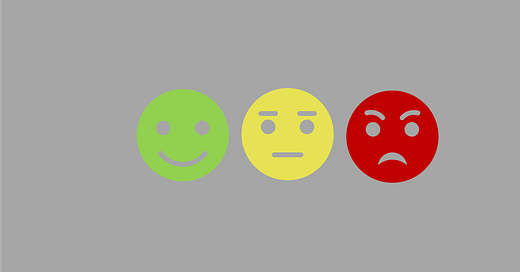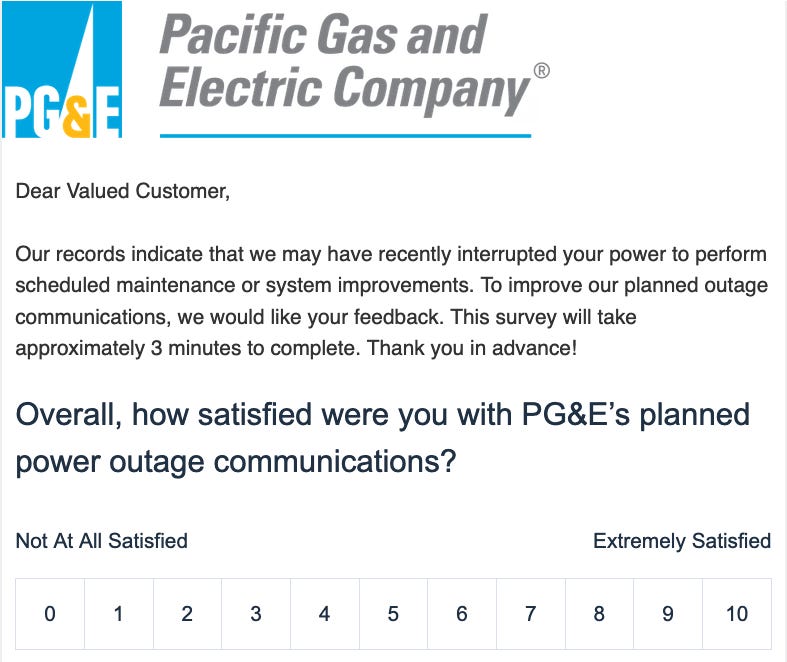Every time I leave my parents’ assisted-living facility, I get a text asking me to rate it.
That seems extreme. It’s already too much that every time I order something online, I’m asked to rate it. Every time I rent an Airbnb. Even, lately, every time I go to the doctor.
Restaurants. Netflix shows. Ride-sharing services. Package deliveries. Zoom meetings. Software support articles. Plane trips. Internet service providers. Dentists. Mortgage banks. These days, everything has to be rated. Every product. Every service. Every interaction.
I’ve watched only one episode of Black Mirror, the British TV series that’s a modern-day Twilight Zone. But it was creepier than anything I’ve ever seen on Twilight Zone — so creepy that I refused to watch any more of the show.
The “Nosedive” episode takes the concept of rating to an extreme that’s even more extreme than rating every visit to an assisted-living facility. It’s set in a world where people use their smartphones to rate every interaction with another person — even personal interactions not related to business. These ratings affect their socioeconomic status, which of course affects their well-being and their livelihood.
It’s creepy because it’s not that far from our current reality.
In a sense, we’re rated every time someone likes our Facebook or Instagram posts. More directly, and with more potential consequences, we’re rated as consumers of sharing services like Lyft and Airbnb. How long will it be till we’re rated as patients by our doctors? Till the assisted-living facility rates us?
Maybe they already are.
Think that’s far-fetched? It’s happening in at least one area that’s not as visible to most people as Lyft or Airbnb. Bad experiences with building contractors seem to be more common than good ones. But clients can be problematic, too — and now, contractors have a site where they can rate us.
Even less visible are the “customer lifetime value scores” that are already being applied to most of us across industries. Did you know about these? I didn’t. According to ABC News in Cleveland, “Anyone who’s shopped online, used a bank, has a cell phone or credit card, drives a car, or has traveled on a plane probably has a score. Likely, more than one.”
In the digital age, companies can share data about us, compile that into ratings, and then use those ratings to decide how they’ll treat us. Have a low rating? You might have to settle for worse seats on a plane, lower discounts, or even longer hold times when calling companies — yes, they can actually route your call to a different number. How do you know if you have a low rating? You don’t; the scores are private, in addition to being unregulated.
Of course we should strive to be good customers and clients, and we should be considerate to people we do business with. Of course companies should strive to treat their customers well.
But the constant rating is stressful. Don’t do anything that might be perceived negatively, or your Lyft driver might blackball you. Don’t complain too much about a bad Airbnb, or you might find it hard to rent another one. And watch out for contractors!
Then, if you’re anything like me, there’s the guilt. You may not be like me; I feel guilty when a security guard watches me in a store, even though I’ve never shoplifted in my life. But even so, you might feel some pangs of guilt similar to mine. If I don’t take the time to rate something, I feel guilty. Maybe my rating will help the business or the employee. Shouldn’t I weigh in?
On the flip side, I hesitate to submit a bad rating if it could jeopardize someone’s job. When a package was recently delivered to our neighbors despite having our address on it, we didn’t complain to Amazon. After all, we managed to find the package. I’m often inclined to rate a bit more positively than the situation might warrant, or to avoid rating, out of consideration for people and their livelihood.
But sometimes my positive ratings are also affected by the fact that I don’t want my own ratings to go down. The last Airbnb I stayed in was just okay: a small, dark apartment whose main pluses were that it was in a great location, came with access to a pool, and was in the same building where my friends were staying. The owner was clear about the drawbacks, but in my review I didn’t mention the large dead cockroach in the kitchen, the lack of curtains on the bedroom window, or the building manager who barged in unannounced to deliver coffee filters while I was in the bathroom (I did mention the last two to the owner, privately).
Apparently, I’m an outlier. Most people, it turns out, skew toward negative ratings and reviews. There’s psychology behind that.
Would that remain the case if we were all rating one another, like in that Black Mirror episode? That would certainly increase the complexity of ratings.
China famously tried something heading in that direction, though it’s been much exaggerated. Although China’s Social Credit System has been the subject of a lot of fear and loathing, in practice, it sounds more like the customer ratings we’re already subject to in the U.S. Rather than monitoring and assessing individual behavior, the system focuses on business interactions. Rating us as people doesn’t go over well in any society.
Even when it comes to the business environment, rating consumers may not always have the consequences that companies intend. Lyft and Airbnb ratings are meant to foster transparency and safety. But some research suggests that the practice of rating customers can not only alienate them but may even drive the very behaviors it’s intended to discourage.
I don’t particularly want to be rated — I do enough of that inside my own head already, thank you! — but I’m also tired of the constant requests to rate everything. If I get one more text from the assisted-living facility … well, I won’t do anything, because it would be counterproductive to block their number, and they’re not going to stop asking for my feedback. I’ll just have to add those texts to the list of rating requests constantly coming at me that I need to swat away, like so many flies buzzing around my head. And remind myself that I’m lucky to have stuff to rate.
Update: Since I wrote this, I’ve gotten these requests for ratings, among others.
































Kind of reminds me of that Seinfeld episode where Elaine is trying to get her medical records because they have written that she's a complainer.
I left an honest review on an Airbnb once, stating the great things, and the bad things about the apartment. The host got mad and wrote that I must not have traveled at all, blah, blah, blah. He got so defensive even though I mentioned so many good things about the place!
Yes! I’m so tired of this! My email inbox is full of requests for reviews. How did you like this product give us a review. Every time you go to the car dealership for service. “Nothing less than 10 on our satisfaction survey is acceptable” We just purchased a house & now I’m getting hounded by the realtor & the mortgage broker for reviews. However, I also have all the guilt! I feel bad if I don’t leave one but don’t want to jeopardize someone’s job with a bad review! I’m a bit of a hypocrite with Amazon I never take the time to leave a review but often count on them to decide which version of a particular item I should buy! 🤷🏻♀️